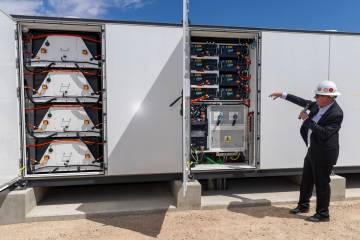Economist pokes holes in ‘shadow inventory’ theory
Shadow housing supply? What shadow housing supply?
A North Carolina-based economist with Wells Fargo Securities dropped a surprise on the audience during a Thursday housing forum at The Orleans when he called the potential for a big inventory of empty or repossessed homes waiting to flood the market a “phantom idea.”
Eugenio Aleman said shadow supply simply doesn’t exist in “markets that work.”
“And the market is working now. Everyone who wants to sell their home is selling their home,” said Aleman, a speaker at the Nevada Housing Forum, put together by the state Department of Business and Industry and UNLV’s Lied Institute for Real Estate Studies and Lee Business School. “I do 160 presentations every year in across the U.S., and everybody has the same issue: There are no homes for sale. And that is the reason prices are skyrocketing. If you’re waiting for shadow inventory to hit the market, don’t, because it’s not coming, according to my analysis.”
Naturally, with thousands of empty and repossessed homes across Southern Nevada, some eyes rolled in the crowd of about 120 real estate agents, builders, appraisers and members of the public.
Jack Woodcock, a longtime local real estate broker and a past president of the Greater Las Vegas Association of Realtors, asked Aleman how locals should be counting the inventory of “people in their homes, not paying their mortgage,” and using state laws such as the Homeowners Bill of Rights, which took effect Oct. 1, to “game the system.”
Said Aleman: “I don’t know local information well, but in the big theme of the housing market, I don’t think that would be a very large inventory of homes.”
Aleman also discounted the idea that banks would sit on homes rather than put them on the market.
“If a bank doesn’t want to put a home on the market, it would have to go out of business because if you hold a home, the home loses value every day,” he said. “It’s ludicrous to think banks will hold too many homes. Banks are not in the business of holding homes. They lose money, and banks don’t want to lose money.”
Other forum speakers backed up the idea that shadow inventory is at least not the ticking time bomb it used to be.
Luis Lopez, data analyst for the Lied Institute, said Nevada’s supply of homes with mortgage payments that are at least 90 days late has plummeted from a peak of 90,000 in 2010 to 37,000 today. The ranks of homes in foreclosure have fallen from 40,000 in 2011 to 17,000 now.
Still, that’s a lot of homes, Woodcock told the Review-Journal after the forum.
Woodcock said he agreed in principle with Aleman’s theory that some observers are blowing shadow inventory’s possible effects out of proportion.
“But every market has its own challenges,” Woodcock said.
“My objective was to shine a light on the (Nevada) Legislature, to ask if their interference in the market is producing the results they intended. We know there’s a reluctance on the part of financial institutions to foreclose as a result of state legislation. The laws are an example of good intentions that produced unintended consequences that have negatively affected our recovery.”
And with the sheer volume of local foreclosures during and after the recession, it’s a given that banks think “very strategically” about timing how and when foreclosures hit the market, Woodcock said. That means they’re, well, holding homes.
Shadow supply wasn’t the only hot topic at the forum.
Marcus Conklin, the Lied Institute’s associate director, led a panel of local real estate and business experts. Conklin’s biggest question: Is the Las Vegas market experiencing another housing bubble?
Opinions were mixed.
Tisha Black-Chernine, a real estate attorney with local law firm Black &LoBello, said the market is moving into price-correction mode after a 15-month run of double-digit annual appreciation gains. She also noted that Nevada still has the nation’s worst unemployment rate, and cash investors continue to play a big role in the market.
“I worry our recovery is a bit tenuous,” she said. “Until we get our employment numbers up, I think we need to be careful of being too excited about what’s going on. I think we’re still an undervalued market, but I’m reticent to believe in solid values today.”
But Scott Dugan, an appraiser with R. Scott Dugan Appraisal Co., said Las Vegas still has too few homes for sale.
A city of 2 million should have 15,000 units listed. But today’s for-sale inventory stands at about 8,000. Southern Nevada’s median price is still below what fundamentals justify, according to national analysis firms, Dugan added. And when it comes to shadow inventory, even if it exists, “no one is going to dump 20,000 homes on the market” all at once, he said.
Stephen Jones, managing member of Merlin Contracting, also said he expects his building company to do brisk business at least through 2014. About half of the people buying homes his company builds are “fleeing California” or the East Coast for tax reasons.
Whether there’s a bubble may not even be the key issue, added panelist Ash Mirchandani, deputy director of the Nevada Department of Business &Industry. There are enough positives, such as fewer underwater borrowers, and negatives, including higher interest rates and lots of investors, to call it either way, he said. The more important concern is whether the city can prevent history from repeating itself.
Said Mirchandani: “The bigger question, in my mind, is have we learned from our past?”
Contact reporter Jennifer Robison at jrobison@reviewjournal.com. Follow @J_Robison1 on Twitter.




























